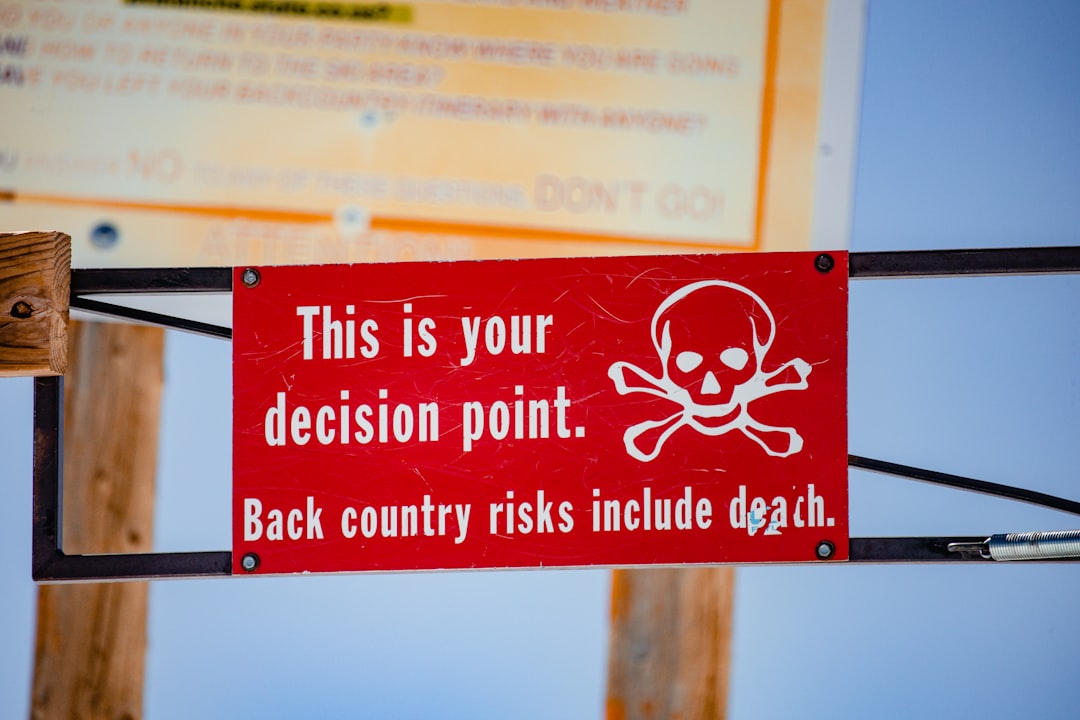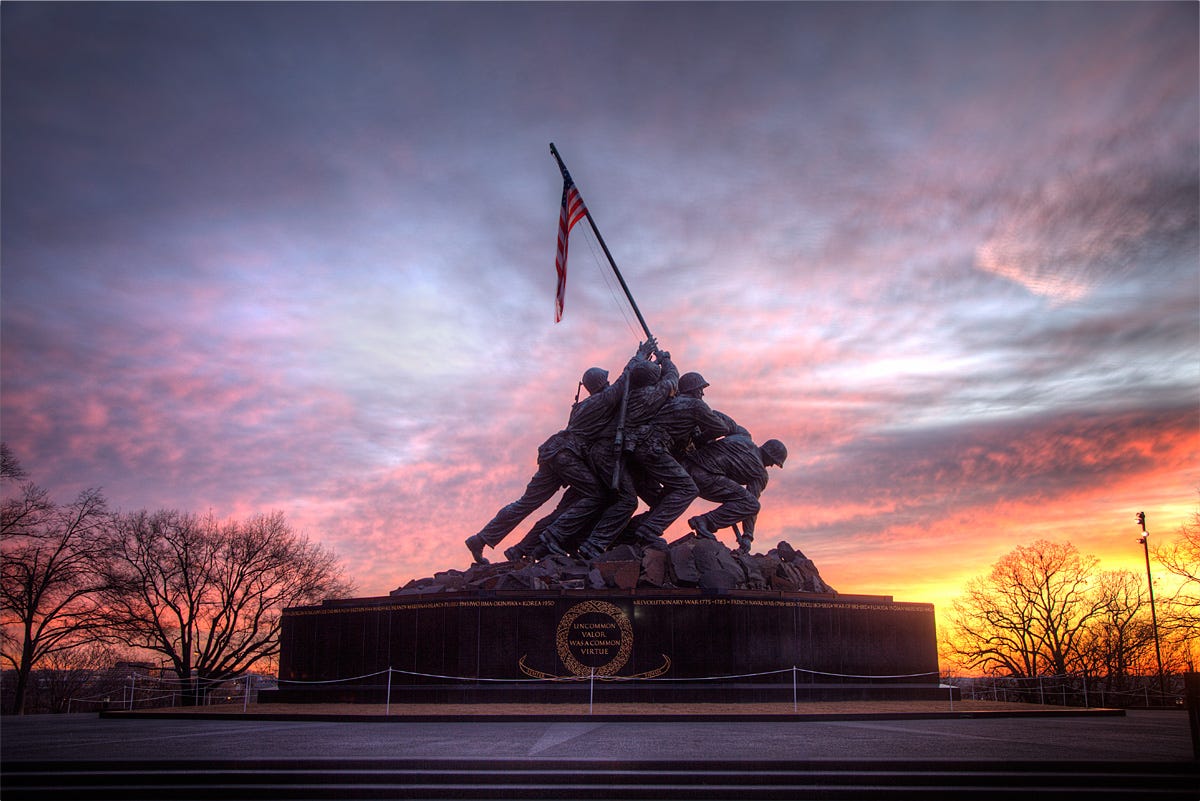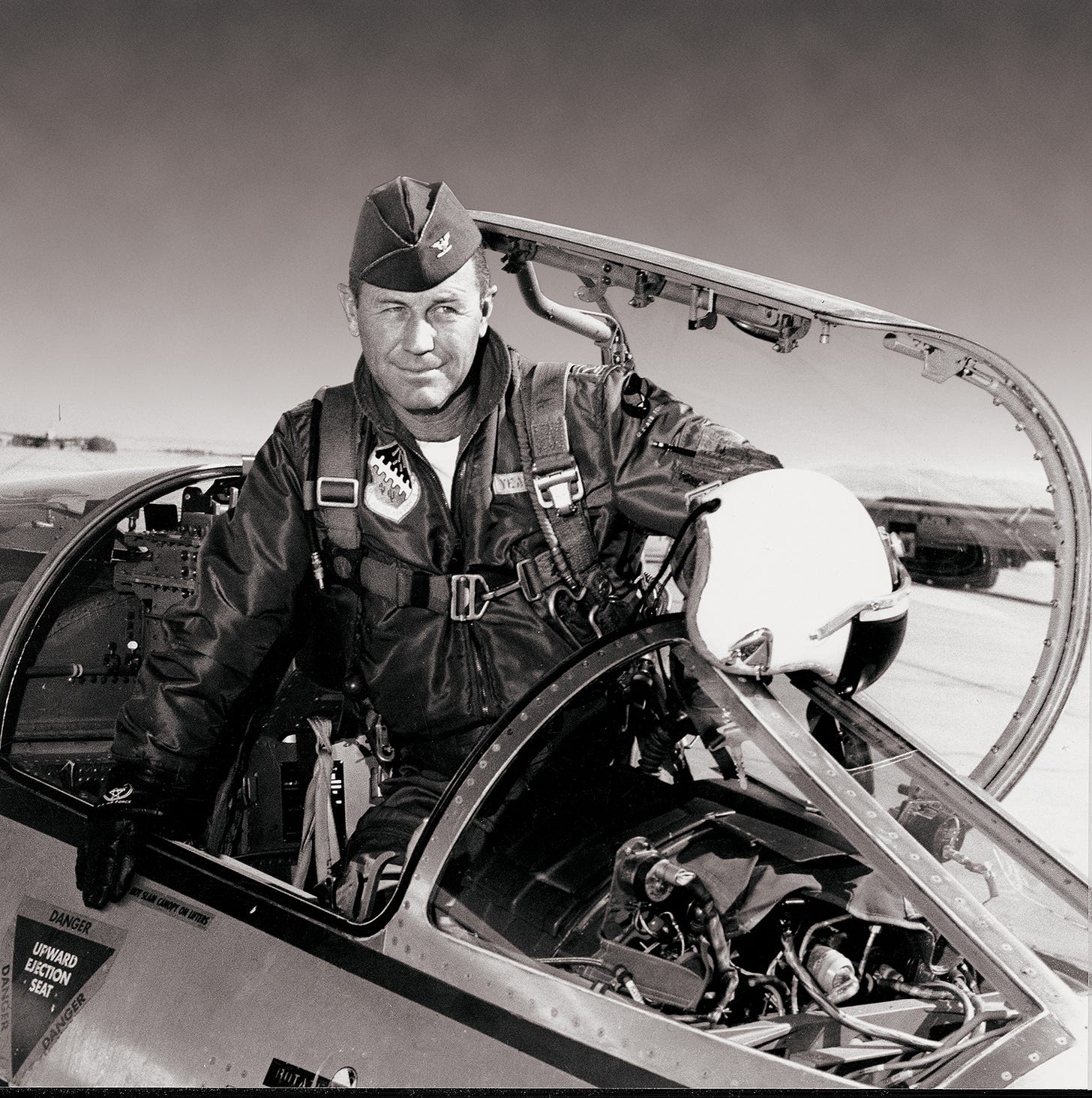Courage, American Style
America's future will be determined by whether fear or fortitude guides our path.
“Americans love to fight. All real Americans love the sting of battle. When you were kids, you all admired the champion marble shooter, the fastest runner, the big-league ball players and the toughest boxers. Americans love a winner and will not tolerate a loser. Americans play to win all the time.”
— General George S. Patton, May 1944 in a speech constructed by soldiers and recorded by historian Terry Brighton.

Taking an evening walk with my son and dogs around a park near our home, I watched as a boy and girl — probably around eight or nine years old — rode their bikes through the grass and down a slope steep enough that in winter makes for a black-diamond sledding hill. Both were barefoot and without helmets. The girl’s long, golden hair carried by the breeze was the last I saw as the pair peddled furiously out of view. I looked around. No parents. No nanny. No park overseer waiting to scold them for enjoying the day’s lingering sunset with such reckless abandon. I smiled at the thought that even in this time of safety-at-all-cost there were these two kids unaware of the cynical fearful world beyond the park. Then it made me sad. I wasn’t mournful in a sense of passing nostalgia, but in realizing these kids were an endangered species. And if the government and emboldened neighborhood scolds had their way, they would be extinct.
It’s stunning how many people slip into the temptations of authoritarianism when the government and corporate interests sell it as “for your own protection.” This is not surprising, though, considering America has now come of age when these entities have taken the place of religion. We live and die by its diktats. But the difference — subtle to the unquestioning believer, but glaring to the skeptic — is that this altar built by men to worship man is one that sacrifices individuality and freedom for control and fear.
When America retreats to the shadows of fear and sacrifices the most vulnerable in society for selfish acts of self-preservation, there can be no room for heroics. The coward despises the hero because it exposes him for the recreant conformist he is: a person lacking the moral fortitude to stand on principles he only feigns to possess until his comfort is threatened. Then he cowers behind the security of the baseless crowd, hoping to disappear, wallowing in his contrived victimhood.
We should refuse to be good little boys and girls, content with pats on the head and the crumbs the government mercifully throws us. Political elites expect us to dutifully snap back in line when they stomp their feet and wave their arms and yell “science!” and promise to keep us safe in exchange for compliance.
What made us stop being a nation of dreamers and bold risk-takers and start being one of a fearful herd, paralyzed by indulging our apprehension and neuroses? It is a question that has haunted me since that evening walk, and when I started reading Tom Wolfe’s The Right Stuff for Ben Domenech’s The Transom Book Club* fear was at the top of my mind. It is a shockingly strong emotion — one that can cause a person to behave in the most irrational manner and can spiral down to an out-of-control realm where at the bottom lies destruction.
Consider an example of the men of that era. Here is an account of the legendary aviator and test-pilot Chuck Yeager in The Saturday Evening Post:
Yeager flew in World War II, downing 13 German planes and being shot down himself in France (“He escaped into Spain, was jailed, escaped again.”). Recognized by his superiors as a “born flier,” Yeager was selected for test runs of the Bell X-1, a rocket-powered plane, over Rogers Dry Lake in southern California. The crew was unsure they’d be able to break the sound barrier, but by all accounts the mood among them on the Muroc Army Air Field in 1947 was electric. On his fourth run, Yeager blasted all four rockets at once — against orders — and came just short of sonic speed. To allay the doubts of their commander, Brigadier General Albert Boyd, Yeager and Major Jackie Ridley travelled to Dayton to share data showing they could take the X-1 all the way.
It was on Yeager’s ninth powered flight in the X-1, on October 14, 1947, that he went supersonic. “Flame leaped from the rocket tubes,” the Post story goes. “It stood forth, sharp-edged and 100 feet long. Yeager tilted the X-1 into a climb and went through the dreaded sonic wall as if it were cheese.” He travelled 25 times the speed the Wright brothers had 44 years earlier
The men who would go on to become America’s first astronauts were celebrated as heroes, not just for the sake of celebrity, a ridiculous side effect of our attention deficit technology disordered society, or pop stars as thought leaders like our current presidential administration like to put forth, but real life heroes: men unafraid of their masculinity, of boldness, of harnessing recklessness to push the envelope of physical and mental limits. Fear is a foreign concept; courage is the order of the day. And America loved it. The journey to space had all the elements of the best of America, distilled into a potent tonic, wrapped in Old Glory: innovation, daring, adventure, unpredictability edged with risk, fearlessness. These men were instantly made immortals of history even as that moment of explosive celebrity would eventually fade. Hell, even their wives were featured on magazine covers.
Now, space is barely an afterthought, and America’s space program — the same one that arguably contributed to the demoralization of the Soviets and had a piece in ending the Cold War — was criticized by The New York Times for its lack of inclusivity compared to the Космическая программа СССР. On the 50th anniversary of the Apollo moon landing, the paper ran an article with the headline, “How the Soviets Won the Space Race for Equality: The U.S.S.R. sent women and people of color to space years before the U.S.”
It should come as no surprise, then, that our politicians have positioned America in prostrate to our present foes. Where once we harnessed our great economic, political, and cultural power to win the Cold War, we cede our moral ground before their diplomats and military, allow technology to be corrupted by Chinese influence, and hold our hats in hand in Hollywood. Even sports are touched by this vapidity. Compare one of the greatest moments in sports history, the 1980 victory of the U.S. ice hockey team over the Soviets at Lake Placid — the “Miracle on Ice” — to ESPN giving American-born skier Eileen Gu, who competed in the Beijing Olympics for China, its “Breakthrough Athlete of the Year” award.
The same is happening with cancel culture. To be protected from being labeled a bigot, fascist, sexist, homophobe, or generally a hatemonger, we let progressives determine the social and cultural boundaries (or lack thereof) and disengaged from the fight over language and free speech. But it was in vain. As soon as political leaders and corporate business executives capitulated and bent the knee to the woke mob, the left became emboldened and surged like ants over rotting meat. Undefended from the radical’s insatiable appetite we are starved for strong leadership and a spark that ignites the courage to stop America’s unraveling. We want to fight, but we cannot do it alone. We know America is good. We believe in our Founders’ vision and our standing as the world’s best hope for freedom and liberty. We are anxious for the battle against an upside-down narrative in which victimhood and identity politics have taken the place of patriotism, free expression, and the pursuit of happiness unhindered by the chains of vague notions of social justice and contrived political correctness.
Conservatives need to take unconditional, unapologetic ownership of these American ideals. The left will never be satisfied with any concessions and will never admit fault. We already have plenty of gutless wonders roaming the halls of Congress, making empty promises in the glare of television cameras.
I’ve considered carefully whether to delve into the deeply personal here, but ultimately, I thought if it could be helpful to anyone it would be worth it. And hey, if this post is about defying fear, I should practice what I write…
I have struggled very seriously for a significant part of my life with a debilitating eating disorder. I’ll spare you the details, but it was rooted in the sense of outsized fear. There has been much theorizing about personality types, athletics, and brain chemistry, but I really think it’s rooted in unfounded fear: the worst variety of demons to inflict itself on the world. The fear manufactured a million little lies that altered how I thought of myself and the world around me. My perceptions were no longer grounded in reality. My world became smaller as I constructed irrational rules around my behavior, all meant to give me a sense of safety. The little lies turned into bigger ones until I just became them. It was a deep, dark, suffocating hole that swallowed my existence and very nearly took my life. It is a cause of great shame. But I learned that the more I retreated into this false sense of security the more rigid the rules became, and they smothered the girl who used to crave adventure, who dreamed big dreams, whose imagination was seeded in reading Star Wars novels and H.G. Wells led her to leave home for Washington, D.C. with a suitcase and an apartment leased through Craigslist sight unseen, then off to the Marine Corps.
Even now, it is a daily fight against self-doubt and trepidation. But the best way to drown the fear is to think of the generations of selfless young men and women who left their own safety and comfort to walk up to the line of recklessness and dive head-first into chaos and danger and certain death to create a world we take for granted.
I see reflections of this played out in America today — the rules and restrictions made in the name of safety but are actually nonsensical impositions for the purpose of control. From COVID health regulations and masking to language and censorship rules around transgenderism (pronouns and deadnaming), to how we talk about race, abortion, and “women’s rights” or “healthcare,” even to diseases like the current monkeypox hype, our lack of courage to defy the irrational and anti-normative reveals the creeping cowardice born out of fear. To preserve any semblance of a society anchored in reality and to have a culture worthy of both our bold explorers and heroes of the past and those born in the following generations, we must not listen to the lies, because we will become them.
We need more men like Patton and Yeager. We need to be models of courage and adhere to timeless principles and virtues that will raise the next generation of heroes and leaders. Americans love to fight, and we will follow a strong leader into the fire of battle for a just cause. America, our Constitutional freedoms, and personal liberty are worth that fight. We must never retreat because we might be unable to regain that lost ground. Imagine if Patton or Yeager, instead of risking it all for the win decided it was better to lounge in the comfort of safety and security. What a horrific thought.
In his 1944 speech, General Patton also said, “Every single man in the army plays a role. So don’t ever let up. Don’t ever think that your job is unimportant.” We are all owners of America’s legacy. Let us be on the side of a legacy of virtue, goodness, and freedom.

*I recommend subscribing to Domenech’s The Transom newsletter. It is essential reading for political and cultural news that often includes links to important stories and ephemera that doesn’t receive much attention in the mainstream media. I have it as a recommendation on the homepage.
And please consider joining the Book Club. I’ve had the great pleasure of meeting many smart, insightful, funny people through it all while learning much more about the books we discuss than I ever could on my own. I promise you won’t regret it.







Enjoy your insights and the way you easily create pictures in the readers mind. Very courageous inserting your personal story.
It was a pleasure to meet you in person as well. You speak as you write -- with gentleness. I'm grateful Ben has brought like-minded people together to dive deeper into these topics. I don't imagine Ben has realized what a benefit he has provided by bringing a collection of strangers together.
I look forward to your following essay and our next book club. Take care!!!